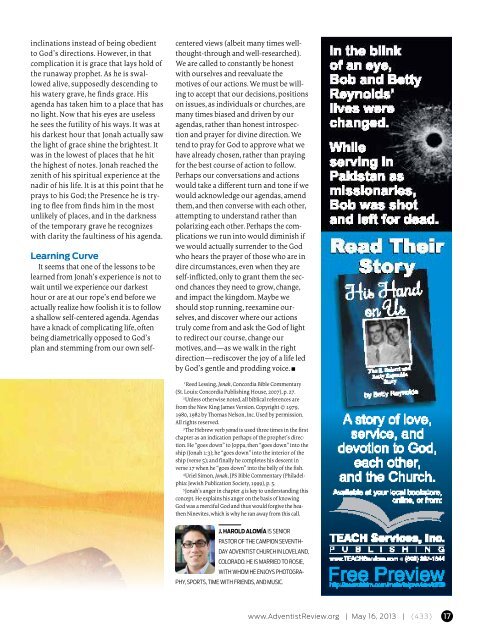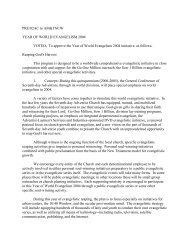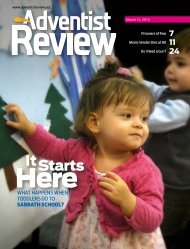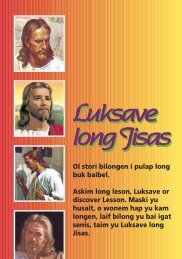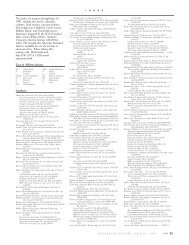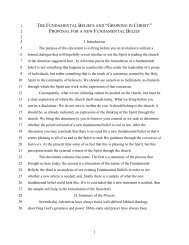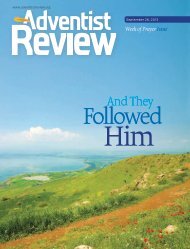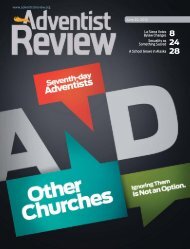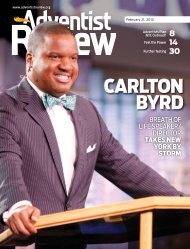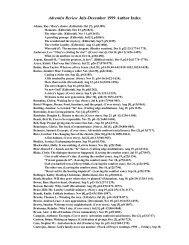Christ Kona?
Download PDF - Adventist Review
Download PDF - Adventist Review
- No tags were found...
You also want an ePaper? Increase the reach of your titles
YUMPU automatically turns print PDFs into web optimized ePapers that Google loves.
inclinations instead of being obedient<br />
to God’s directions. However, in that<br />
complication it is grace that lays hold of<br />
the runaway prophet. As he is swallowed<br />
alive, supposedly descending to<br />
his watery grave, he finds grace. His<br />
agenda has taken him to a place that has<br />
no light. Now that his eyes are useless<br />
he sees the futility of his ways. It was at<br />
his darkest hour that Jonah actually saw<br />
the light of grace shine the brightest. It<br />
was in the lowest of places that he hit<br />
the highest of notes. Jonah reached the<br />
zenith of his spiritual experience at the<br />
nadir of his life. It is at this point that he<br />
prays to his God; the Presence he is trying<br />
to flee from finds him in the most<br />
unlikely of places, and in the darkness<br />
of the temporary grave he recognizes<br />
with clarity the faultiness of his agenda.<br />
Learning Curve<br />
It seems that one of the lessons to be<br />
learned from Jonah’s experience is not to<br />
wait until we experience our darkest<br />
hour or are at our rope’s end before we<br />
actually realize how foolish it is to follow<br />
a shallow self-centered agenda. Agendas<br />
have a knack of complicating life, often<br />
being diametrically opposed to God’s<br />
plan and stemming from our own selfcentered<br />
views (albeit many times wellthought-through<br />
and well-researched).<br />
We are called to constantly be honest<br />
with ourselves and reevaluate the<br />
motives of our actions. We must be willing<br />
to accept that our decisions, positions<br />
on issues, as individuals or churches, are<br />
many times biased and driven by our<br />
agendas, rather than honest introspection<br />
and prayer for divine direction. We<br />
tend to pray for God to approve what we<br />
have already chosen, rather than praying<br />
for the best course of action to follow.<br />
Perhaps our conversations and actions<br />
would take a different turn and tone if we<br />
would acknowledge our agendas, amend<br />
them, and then converse with each other,<br />
attempting to understand rather than<br />
polarizing each other. Perhaps the complications<br />
we run into would diminish if<br />
we would actually surrender to the God<br />
who hears the prayer of those who are in<br />
dire circumstances, even when they are<br />
self-inflicted, only to grant them the second<br />
chances they need to grow, change,<br />
and impact the kingdom. Maybe we<br />
should stop running, reexamine ourselves,<br />
and discover where our actions<br />
truly come from and ask the God of light<br />
to redirect our course, change our<br />
motives, and—as we walk in the right<br />
direction—rediscover the joy of a life led<br />
by God’s gentle and prodding voice. n<br />
1<br />
Reed Lessing, Jonah, Concordia Bible Commentary<br />
(St. Louis: Concordia Publishing House, 2007), p. 27.<br />
2<br />
Unless otherwise noted, all biblical references are<br />
from the New King James Version. Copyright © 1979,<br />
1980, 1982 by Thomas Nelson, Inc. Used by permission.<br />
All rights reserved.<br />
3<br />
The Hebrew verb yarad is used three times in the first<br />
chapter as an indication perhaps of the prophet’s direction.<br />
He “goes down” to Joppa, then “goes down” into the<br />
ship (Jonah 1:3); he “goes down” into the interior of the<br />
ship (verse 5); and finally he completes his descent in<br />
verse 17 when he “goes down” into the belly of the fish.<br />
4<br />
Uriel Simon, Jonah, JPS Bible Commentary (Philadelphia:<br />
Jewish Publication Society, 1999), p. 5.<br />
5<br />
Jonah’s anger in chapter 4 is key to understanding this<br />
concept. He explains his anger on the basis of knowing<br />
God was a merciful God and thus would forgive the heathen<br />
Ninevites, which is why he ran away from this call.<br />
J. Harold Alomía is senior<br />
pastor of the Campion Seventhday<br />
Adventist Church in Loveland,<br />
Colorado. He is married to Rosie,<br />
with whom he enjoys photography,<br />
sports, time with friends, and music.<br />
www.AdventistReview.org | May 16, 2013 | (433) 17


